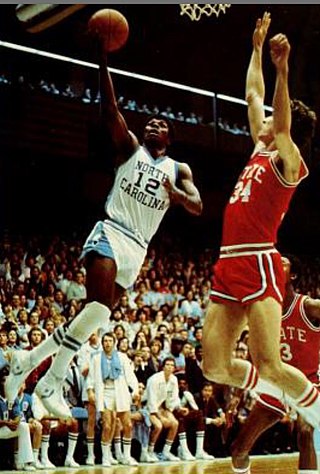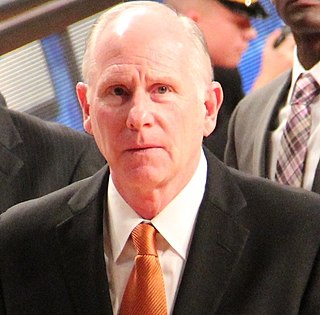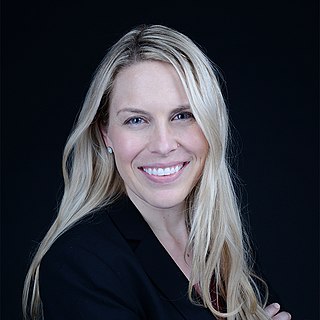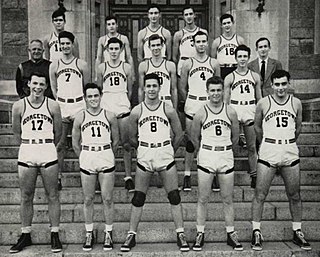
Tug of war is a sport that pits two teams against each other in a test of strength: teams pull on opposite ends of a rope, with the goal being to bring the rope a certain distance in one direction against the force of the opposing team's pull.

A student is a person enrolled in a school or other educational institution.

Hope College is a private Christian liberal arts college in Holland, Michigan, United States. It was originally opened in 1851 as the Pioneer School by Dutch immigrants four years after the community was first settled. The first freshman college class matriculated in 1862, and Hope received its state charter in 1866. Hope College is affiliated with the Reformed Church in America and retains a Christian atmosphere. Its 120-acre (49 ha) campus is adjacent to the downtown commercial district and has been shared with Western Theological Seminary since 1884. The Hope College campus is located near the eastern shores of Lake Michigan and is 2.5 hours away from two major cities, Chicago and Detroit.
Michael Bartley Peters, better known as Mike Peters, is an American Pulitzer Prize-winning editorial cartoonist and the creator of the comic strip Mother Goose and Grimm.
A varsity team is the highest level sports team regularly representing a high school. Varsity teams compete against each other during a given athletic season. In the United States, a varsity team is one step above a school's junior varsity (JV) team and composed of more experienced players. The term comes from a shortening of "university", referring to the top-level team that would represent a university in matches against other universities, while lower-level squads were largely relegated to intramural events.

William "Bill" Arthur Carr was an American athlete and double Olympic champion in 1932. Called the "Arkansas flyer," Carr never lost a race during his college and Olympic career.

Natalie Morales-Rhodes is an American journalist who recently was a co-host and moderator of the CBS Daytime talk show The Talk. Prior to that, Morales worked for NBC News for 22 years in various roles as the West Coast anchor of Today and appeared on Dateline NBC and NBC Nightly News.

Phil Jackson Ford Jr. is an American former professional basketball player in the National Basketball Association (NBA). He graduated from Rocky Mount Senior High School in 1974, and had an All-American college career with the North Carolina Tar Heels.
Redshirt, in United States college athletics, is a delay or suspension of an athlete's participation in order to lengthen their period of eligibility. Typically, a student's athletic eligibility in a given sport is four seasons, aligning with the four years of academic classes typically required to earn a bachelor's degree at an American college or university. However, in a redshirt year, student athletes may attend classes at the college or university, practice with an athletic team, and "suit up" for play – but they may compete in only a limited number of games. Using this mechanism, a student athlete (traditionally) has at most five academic years to use the four years of eligibility, thus becoming what is termed a fifth-year senior. Due to the COVID-19 pandemic, an additional year of eligibility was granted by the NCAA to student athletes who met certain criteria. Student athletes who qualified had up to six academic years to make use of their four years of eligibility, taking into consideration the extra year provided due to exceptional circumstances.

James Joseph Larrañaga is a former college basketball coach. He was most recently the head coach of the University of Miami Hurricanes men's basketball team from 2011 to 2024 when he retired.

The 2008 Oregon Ducks football team represented the University of Oregon as a member of the Pacific-10 Conference (Pac-10) during the 2008 NCAA Division I FBS football season. Led by Mike Bellotti in his 14th and final season as head coach, the Ducks compiled an overall record of 10–3 with a mark of 7–2 in conference play, tying for second place in the Pac-10. Oregon was invited to the Holiday Bowl, where the Ducks defeated Oklahoma State, 42–31. The team played home games at Autzen Stadium in Eugene, Oregon.

The 2008 Tennessee Volunteers football team represented the University of Tennessee in the 2008 NCAA Division I FBS football season. The team was led by head football coach Phillip Fulmer in his 16th and final season as head coach. The Vols played their home games in Neyland Stadium and competed in the Eastern Division of the Southeastern Conference (SEC). The 2008 campaign followed a 10–4 2007 season, which saw the Vols win the Eastern Division of the conference and the Outback Bowl. This season marked the ten year anniversary of Tennessee's 1998 BCS National Championship. On November 3, Fulmer announced that, after winning some 150 games over his career, he would step down from coaching his alma mater at the end of the season.

Jeshua Anderson is a retired American sprinter, who specializes in the 400 meter hurdles. He is a 3 time NCAA champion in the 400m hurdles and was the second freshman from Washington State University to ever win the NCAA title. In 2008 Anderson was 400 meter hurdles Junior World Champion and holds the second fastest high school time recorded in the 300m hurdles. He was born and raised in Woodland Hills, California and attended Taft High School. After winning the 2011 Outdoor Championships, Anderson had the competed for team USA at the world championships. He also participated in the 2016 Olympic trials in which he finished as a finalist.
The traditions of Washington & Jefferson College are a key aspect of the culture of Washington & Jefferson College. One of the oldest traditions at Washington & Jefferson College were the "Freshman Rules", a system of rules and restrictions on freshmen. Failure by freshmen to follow these rules would subject them to beatings by upperclassmen or other punishments doled out by the "Freshman Court". During the 1870s and 1880s, the students engaged in organized athletic competitions, pitting the freshman versus sophomore classes in the "Olympic Games" that involved elaborate opening ceremonies and the smoking of a Pipe of Peace." Another form of physical contest between the freshman and sophomore classes were the annual "color rush," where the teams fought over control over strips of fabric, the "pole rush," where the teams battled to raise a flag up a flagpole, and the "cane rush" where the teams fought over control over a ceremonial cane. These contests generally devolved into outright gang violence.

Esther Ruth Lofgren is an American rower and an Olympic gold medalist. She won the gold medal in the women's eight at the 2012 Summer Games in London. Lofgren is a graduate of Harvard College, where she rowed for Radcliffe and was a two-time All-American. She is an eight-time member of the U.S. National Rowing Team and a seven-time World Championship medalist.

The 1996–97 Georgetown Hoyas men's basketball team represented Georgetown University in the 1996–97 NCAA Division I college basketball season. John Thompson, coached them in his 25th season as head coach. Their home court was USAir Arena in Landover, Maryland. They were members of the Big East 7 Division of the Big East Conference, were the regular-season champions of the Big East 7 Division, and finished the season with a record of 20-10, 11-7 in Big East play. Their record earned them a bye in the first round of the 1997 Big East men's basketball tournament, and they advanced to the semifinals before losing to Boston College. They received a No. 10 seed in the West Regional of the 1997 NCAA Division I men's basketball tournament – Georgetown's 18th NCAA Tournament appearance in 19 years – and lost to No. 7 seed North Carolina-Charlotte in the first round.

The 1966–67 Georgetown Hoyas men's basketball team represented Georgetown University during the 1966–67 NCAA University Division college basketball season. John Magee coached them in his first season as head coach. The team was an independent and played its home games at McDonough Gymnasium on the Georgetown campus in Washington, D.C.

The 1965–66 Georgetown Hoyas men's basketball team represented Georgetown University during the 1965–66 NCAA University Division college basketball season. Tommy O'Keefe coached it in his sixth and final season as head coach. The team was an independent and played its home games at McDonough Gymnasium on the Georgetown campus in Washington, D.C. It finished with a record of 16-8 and no postseason play.

The 1963–64 Georgetown Hoyas men's basketball team represented Georgetown University during the 1963–64 NCAA University Division college basketball season. Tommy O'Keefe coached them in his fourth season as head coach, but Georgetown's head coaching position paid so little that he could only coach part-time and held a full-time job outside of coaching in order to meet his financial obligations, impairing his ability to recruit players. The team was an independent and played its home games at McDonough Gymnasium on the Georgetown campus in Washington, D.C. It finished the season with a record of 15-10 and had no postseason play.

The 1942–43 Georgetown Hoyas men's basketball team represented Georgetown University during the 1942–43 NCAA college basketball season. Elmer Ripley coached it in his seventh of ten seasons as head coach; it was also the fifth and final season of his second of three stints at the helm. The team returned to Tech Gymnasium – where Georgetown had played its home games from 1929 to 1940 – on the campus of McKinley Technical High School in Washington, D.C., for its home games. It finished with a record of 22–5 (.815) and became the first Georgetown team in history to participate in a post-season tournament, advancing to the final game of the NCAA tournament, losing to Wyoming. Its youth and inexperience led it to be nicknamed the "Kiddie Korps."













